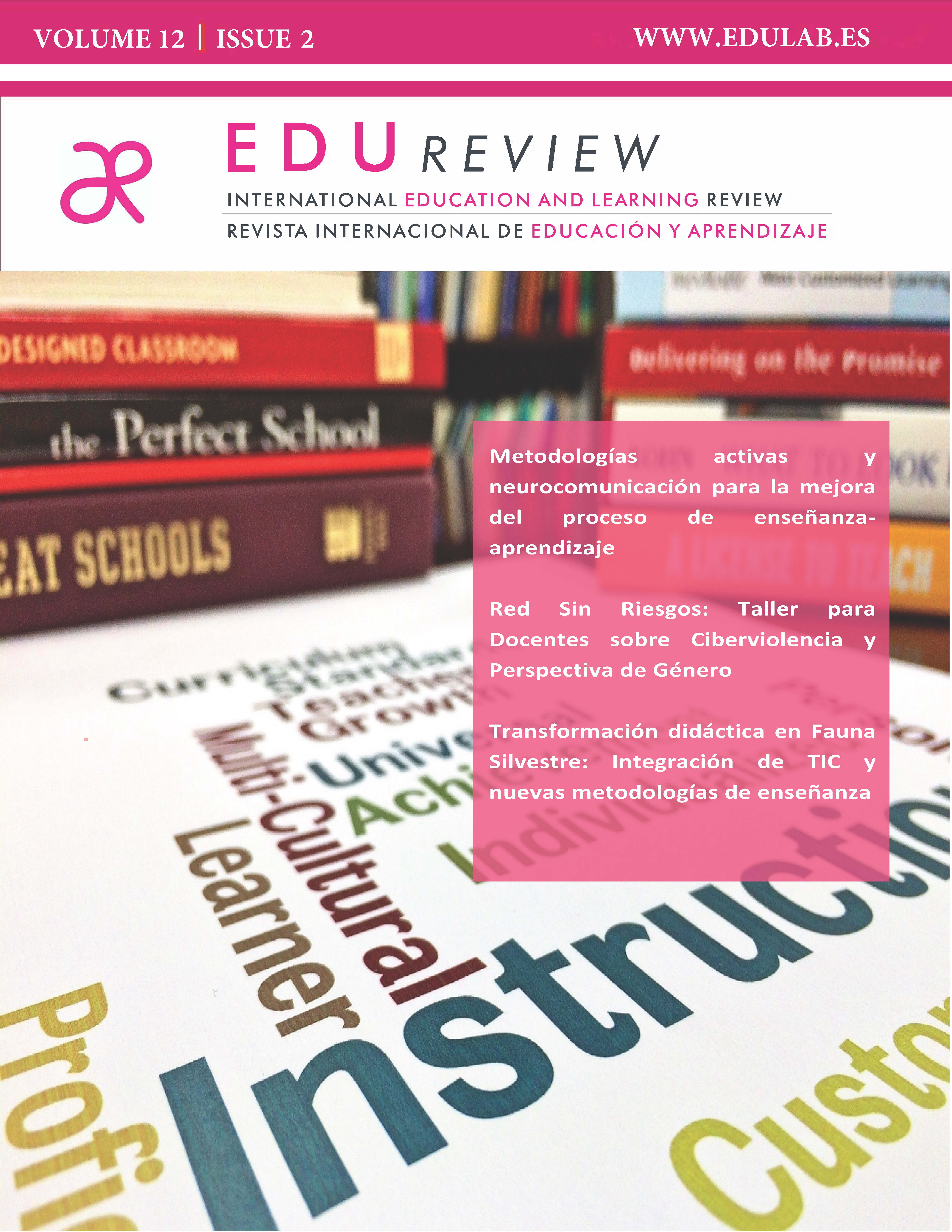Learning and Education in Morocco Between Modernity and Cultural Traditions
DOI:
https://doi.org/10.62701/revedu.v12.5188Keywords:
Education, Learning, Culture, Modernity, FamilyAbstract
Cultural traditions are part of the identity of the human being. But, the changes brought by modernity reach all aspects and ways of being of people who spontaneously express their acceptance and assimilation or their rejection and condemnation. This article aims to investigate the interest that culture occupies in society for better educational and economic development. The mixed method was applied with a qualitative approach that allows descriptive exploration of the modernization process of Moroccan society, in parallel with the quantitative analysis of data collected from a survey directed at 80 secondary school students.
Downloads
Global Statistics ℹ️
|
560
Views
|
142
Downloads
|
|
702
Total
|
|
References
Astudillo Montalbán, S. M., Viñán Carrasco, G. A., y Delgado Mendoza, H. (2018). Introspección de la cultura urbana y visualidades ontológicas del hip hop a través de una campaña comunicativa. Magazine De Las Ciencias: Revista De Investigación E Innovación, 2(4),97–116. https://revistas.utb.edu.ec/index.php/magazine/article/view/463
Botella Gallego, N. (2018). Mujeres marroquíes transmigrantes: otras maneras de construir la «modernidad alimentaria» // Transmigrant Moroccan women: other ways to build «food modernity». Journal of Feminist, Gender and Women Studies, (6). https://doi.org/10.15366/jfgws2017.6.007 DOI: https://doi.org/10.15366/jfgws2017.6.007
Bouslam, M. (2014). Alibas ataqlidi fi lmagrib: alŷodor wa l’intaŷ wa l’aṣnaf wa ataṭawor [La vestimenta tradicional en Marruecos: las raíces, la producción, los generos y el desarrollo]. Dar Abi Raqraq. Rabat.
Coversi, D. (2021). La americanización y la expansión planetaria del conflicto étnico: La trampa de la globalización. Revista Mural Internacional, 12, e64412.
https://doi.org/10.12957/rmi.2021.64412 DOI: https://doi.org/10.12957/rmi.2021.64412
Crang, M. (1998) [2005]. AlžoƔrafya attaqafya, ahamyat alžoƔrafya fi tafsiri aḍḍawahir al’insanya [la geografia cultural, la importancia de la geografia en la explicación de los fenómenos humanos]. Traducción Said Mintaque, Silsilat ɛalam almaɛrifa (317), imprentas assyassa. Kuwait.
Ghirelli, A. (1926). El norte de Marruecos. Contribución al estudio de la zona de protectorado español en Marruecos septentrional. Editorial Artes Gráficas. Melilla.
Fonseca Martínez, A., y Brull González, M. (2020). Patrimonio cultural e identidad en las universidades. Revista Conrado, 16(74), 379–386. https://conrado.ucf.edu.cu/index.php/ conrado/article/view/1375
González Alcantud (2019). La cuestión artesanal y la modernidad. Artesanías hispano-marroquíes en contacto transfronterizo, culturas de frontera: Andalucía y Marruecos en el debate de la modernidad. Editorial Anthoropos. Barcelona.
González- Ferrín, E. (2022). Cuando fuimos árabes. Editorial Almuzara. Córdoba.
Joseph, E. J. (2004) [2007]. Language and identity. Traducción al árabe de Abdennour kharaqui, silsilat ‘alam alma’rifa, imprentas assyassa, Kuwait.
Ibrahim, A. (1976). Ṣomudon wasaṭa l’i’ṣar, moḥawala litafsiri tariji almagrib alkabir [Resistencia en medio del huracán, intento para entender la historia del Gran Magreb]. Imprenta Annaŷaḥ alŷadida. Casablanca.
Imani Jiyari, H. (2024). Educación patrimonial en educación infantil. Revista Internacional Interdisciplinar De Divulgación Científica, 2(1), 30-40. https://riidici.com/index.php/home/ article/view/22
Martínez-Rodríguez M. (2021). El patrimonio a través de la Educación Musical: Tratamiento y enfoque en el currículo de Educación Primaria. Revista Electrónica Complutense de Investigación en Educación Musical - RECIEM, 18, 27-37. https://doi.org/10.5209/reciem.68682 DOI: https://doi.org/10.5209/reciem.68682
Nossir, S. (2015). Sociolissaniyat almoŷtama’ almagribi wa iškal atadajolat alogawiya [Sociolingüística de la sociedad marroquí y la interferencia lingüística]. Silsilat Azzaman. Rabat.
Qunaou, M. (2018). Atorat ataquafi allamadi almagaribi [El patrimonio cultural inmaterial magrebí]. Dar Al ayam. Aman.
Ramírez-Cruz, H., y Chaparro Rojas, J. F. (2021). Introducción: la diversidad lingüística y la investigación de lenguas en peligro. Forma y Función, 34(2). https://doi.org/10.15446/fyf.v34n2.96558 DOI: https://doi.org/10.15446/fyf.v34n2.96558
Roque, M. Á. (2011). Religión popular, espacio activo de la mujer marroquí. En González Pellón, A. y González Vázquez, A. (Eds.). Patrimonio cultural en Marruecos una aproximación antropológica e histórica, (pp. 177-196). Signatura Ediciones. Sevilla.
Rubio Gil, Á., & San Martín Pascal, M. Á. (2012). Subculturas juveniles identidad, idolatrías y nuevas tendencias. Revista de Estudios de Juventud, 96, .197-213. https://www.injuve.es/ observatorio/valores-actitudes-y-participacion/no-96-jovenes-idolos-mediaticos-y-nuevos-valore
SLIMANI, Y. (2021). Los culturemas en los textos turísticos sobre Marruecos. [Culturemas in tourist texts about Morocco.]. Al-Andalus Magreb, 107. https://doi.org/10.25267/AAM.2021.v28.11 DOI: https://doi.org/10.25267/AAM.2021.v28.11
TUAN, Y. (2007). Topofilia. Editorial Melusina. Barcelona.
Veloza-Morales, M. C., Forero Beltrán, E., y Rodríguez-González, J. C. (2023). Significados de familia para familias contemporáneas. Revista Latinoamericana De Ciencias Sociales, Niñez Y Juventud, 21(1), 1–19. https://doi.org/10.11600/rlcsnj.21.1.5600 DOI: https://doi.org/10.11600/rlcsnj.21.1.5600
Rapport de la cinquantaine (2006). Le Maroc possible, rapport de la cinquantaine, une offre de débat pour une ambition collective [Marruecos posible, informe de la cincuentena, una oferta de debate para una ambición colectiva,]. Éditions Maghrébines. Casablanca.
Downloads
Published
How to Cite
Issue
Section
License
Copyright (c) 2024 EDU REVIEW. International Education and Learning Review / Revista Internacional de Educación y Aprendizaje

This work is licensed under a Creative Commons Attribution-NonCommercial-NoDerivatives 4.0 International License.
Those authors who publish in this journal accept the following terms:
-
Authors retain copyright.
-
Authors transfer to the journal the right of first publication. The journal also owns the publishing rights.
-
All published contents are governed by an Attribution-NoDerivatives 4.0 International License.
Access the informative version and legal text of the license. By virtue of this, third parties are allowed to use what is published as long as they mention the authorship of the work and the first publication in this journal. If you transform the material, you may not distribute the modified work. -
Authors may make other independent and additional contractual arrangements for non-exclusive distribution of the version of the article published in this journal (e.g., inclusion in an institutional repository or publication in a book) as long as they clearly indicate that the work was first published in this journal.
- Authors are allowed and recommended to publish their work on the Internet (for example on institutional and personal websites), following the publication of, and referencing the journal, as this could lead to constructive exchanges and a more extensive and quick circulation of published works (see The Effect of Open Access).













